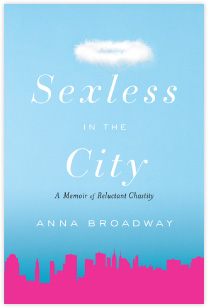Sexual balance, pt. 2: Sensual healing
... your point about friendship and familial bonds being sexless relationships, yet still “deep, meaningful & intimate” doesn’t completely convince me. My point is this: what about those connections with people (presumably beyond mere friendship and familial bond) that also include romantic attractions, aka chemistry, skyrockets, etc. My point is about how those sorts of connections, over time (perhaps after 2 years, as you suggest), can become deep, meaningful and intimate in all the non-physical ways, and that I question the notion that it is in the relationship’s best interest (or the individual’s best interest) to artificially divorce the concomitant physical components of our humanity (i.e. our “whole self”) on the basis that the relationship has not entered into the bonds of matrimony. ...Curious:
Phew! Lots there. First of all, I should probably clarify that in characterizing familial and friend relationships as sexless, I don’t mean either that they’re a) non-sexual (as all relationships are affected by our sexuality and the difference being a man or woman makes in how we approach, experience and understand the world) or b) non-physical. On the contrary! Such deep relationships tend to be filled with hugs, hands to the shoulder and non-sexual regions ... even holding hands and kissing cheeks (in some cultures). That’s because your affections for the other person or people run so deep, it’s impossible for those feelings to remain disembodied.
Tragically through a combination of developments — including, I would argue, the increasing litigiousness of our society and need to legislate against sexual harassment in offices — touch between persons is increasingly defined as sexual for some strange reason (notably excluding handshakes). But frankly, I think that’s in some respects just a weird American thing.
Another factor is the increasing denial of our bodies themselves. So many things and inventions are about minimizing use of the parts, denying or controlling use of the senses. White-collar work is increasingly disembodied, focusing physical activity on a very limited bandwidth of functionality: sight (though our eyes are often used far more to absorb information than to appreciate beauty) and the small-motor coordination of typing. Strange as it may sound, one of the biggest reasons I enjoy certain types of housework and DIY projects like the stripping I did last summer are the whole-body experience of it.
And it’s not just our jobs. We want cars and highways that minimize as much as possible all sensation of flying over terrain at high speeds: no bumps or vibrations, no sound of the other cars flying past beside you, or the wind rushing over the roof. But sometimes I think that encourages recklessness and an ability to disengage potent causes or actions (dangerously high speeds) from their potential effects (brutal smashups on the road). In some cars, there’s little difference between 60 and 90 miles per hour. But in my Eunuch ... man, you could feel the difference between 45 and 50. And until I got the tires balanced properly, coasting along at 70+ turned that rattletrap into a regular vibrathon! Not to say this was an ideal state of transportation (the car was a sure deathtrap, if ever one existed), but it did at least provide powerful reminders to me of my changes in speed and consequently increasing fragility.
My point in all of this is that I think many of us — regardless of our sexual habits or appetites — have lost the ability to appreciate and exercise our sensuality. This is why exercise is so good. It wasn’t until I started running a few years ago that I began to understand that. Which was weird for a nerd like me, to realize what a difference there was between hearing about something, reading about it ... and actually experiencing it in my body. But depending on how fast and hard I push myself, there’s a difference in the way my body feels. There’s a state I can only briefly maintain in current fitness where, at a certain speed, it’s like the entire surface of my skin is suddenly suffused with blood. Push myself to that pace, and immediately I become intensely aware of the whole epidermis in a way that never ever happens otherwise. Or take walking. When was the last time any of you kicked off your shoes or sandles and treated your soles to a patch of spiky grass?
Now to bring this wild and rambling tangent back to your question (for there was, theoretically, a point to my diversion), I conjecture that if we had a more fully developed and broadly indulged sensuality there would be less pressure on sex (as in intercourse and its precursors) to satisfy the bulk of our bodily hungers for sensation. Thus, for those refusing to have sex without a marital commitment behind it, it would be less the transition from a disembodied life to a fully embodied life. Unfortunately, that’s often what the Protestant church implies the move from singleness to married life should be. Look at our worship, for God’s sake! In most churches you stand there like a stone (God forbid your hands get ideas) and if your hips should twitch, well get-thee-behind-me-Satan, there’s a devil at work that taught Elvis how to swivel!
So, bottom line, Curious, I agree with you. I don’t think the physical should be cut out of our relationships. The problem is that we have mostly understood the physical as purely sexual. And if I may so say, the more bookish and nerdy we may be inclined to be (your advanced degree suggests you may somewhat resemble me here ;)), the more limited our understanding of embodiment probably is.
I’ll come back to more of your remarks next week. Thanks to all for making this such a lively discussion!




<< Home